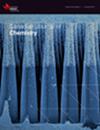Gathering Validity Evidence in the Development of a New Version of the Attitude Toward the Subject of Chemistry Inventory (ASCI-UE)
IF 1
4区 化学
Q3 CHEMISTRY, MULTIDISCIPLINARY
引用次数: 0
Abstract
Organic chemistry is one of the most feared and failed courses due to its complex and fast-paced nature. Investigating affective metrics that relate to achievement in these courses can be worthwhile, particularly when these metrics show predictive relationships to achievement. Attitude toward chemistry has been investigated utilizing a variety of instruments. We present herein an instrument related to the well-established ASCIv2. This new instrument was developed utilizing The Standards of Psychological and Educational Measurement which describe five aspects of validity evidence that should be gathered when using instruments in research. Content validity was gathered through consultation with experts. Response process validity was gathered through student interviews. Internal structure validity was collected through confirmatory factor analysis. Relations to other variables were investigated through correlation analysis and structural equation modeling. Consequential validity was studied through measurement invariance testing before comparing scores for subgroups (high- and low-achieving students). Additionally, reliability evidence was tested with Omega coefficients for each of the factors. We showed that all tests and analyses were done with high rigor, and that this new instrument, ASCI-UE, measuring Utility and Emotional Satisfaction, can provide interesting results and implications for research and practice.新版《化学清单》主题态度量表的效度证据收集
有机化学由于其复杂和快节奏的性质,是最令人害怕和不及格的课程之一。研究与这些课程成绩相关的情感指标是有价值的,特别是当这些指标显示出与成绩的预测关系时。对化学的态度已经利用各种仪器进行了调查。我们在此提出了一种与完善的ASCIv2相关的仪器。这个新仪器是利用心理和教育测量标准开发的,该标准描述了在研究中使用仪器时应收集的效度证据的五个方面。内容效度是通过咨询专家来收集的。通过学生访谈收集反应过程效度。通过验证性因子分析收集内部结构效度。通过相关分析和结构方程建模研究了与其他变量的关系。结果效度通过测量不变性检验来研究,然后比较各组(高、低成绩学生)的分数。此外,对每个因素的可靠性证据进行了ω系数测试。我们表明,所有的测试和分析都是高度严谨的,并且这种新的仪器,ascii - ue,测量效用和情感满意度,可以提供有趣的结果和研究和实践的启示。
本文章由计算机程序翻译,如有差异,请以英文原文为准。
求助全文
约1分钟内获得全文
求助全文
来源期刊

Canadian Journal of Chemistry
化学-化学综合
CiteScore
1.90
自引率
9.10%
发文量
99
审稿时长
1 months
期刊介绍:
Published since 1929, the Canadian Journal of Chemistry reports current research findings in all branches of chemistry. It includes the traditional areas of analytical, inorganic, organic, and physical-theoretical chemistry and newer interdisciplinary areas such as materials science, spectroscopy, chemical physics, and biological, medicinal and environmental chemistry. Articles describing original research are welcomed.
 求助内容:
求助内容: 应助结果提醒方式:
应助结果提醒方式:


